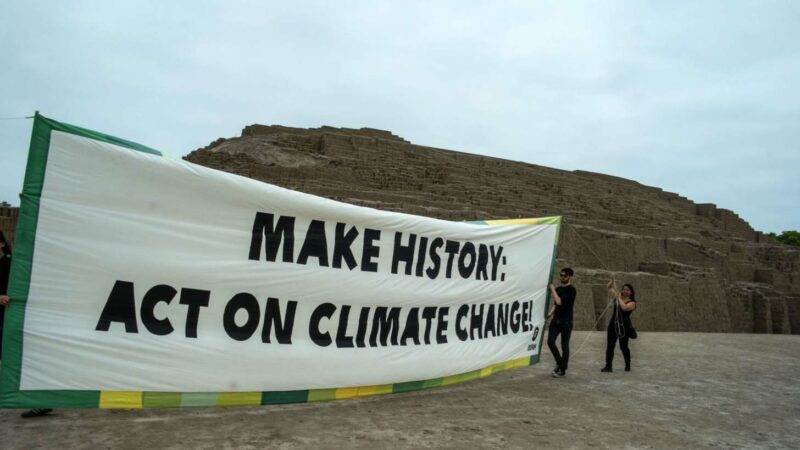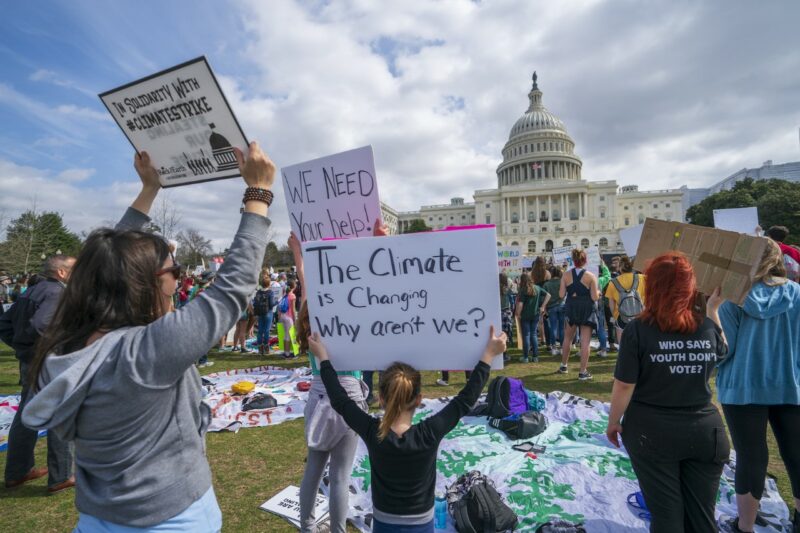Public historians in our climate emergency: an introduction
14 September 2021 – David Glassberg and Donna Graves
covid-19, preservation, social justice, climate emergency series, sense of place, collaboration, environment, sustainability, climate change

Oxfam members on the grounds of the Huaca Pucllana archaeological site in Lima, Peru, with a message for representatives attending the United Nations climate talks meeting there in December 2014. Photo credit: Rodrigo Abd, AP
Editor’s note: This post begins our year-long series, Our Climate Emergency, co-edited with David Glassberg and Donna Graves. The goal of this series brings together a diverse cohort of public historians, all with different perspectives and backgrounds, to think about the role of public historians and the climate crisis. We start with an introduction by the co-editors to introduce readers to the broader series.
What the world has been calling climate change is now a climate emergency. Like others in the U.S. and around the globe, public historians see ever more clearly the threat a warming planet poses to the communities and places we document, preserve, interpret, and care for deeply. This, in the words of Elena Gonzales, is an “all hands on deck” moment. In August 2021, the UN’s Intergovernmental Panel on Climate Change (IPCC) warned that the actions we take between now and 2040—the next 18 years—will determine whether the world’s children coming of age in the second half of the twenty-first century will see ever-worsening manifestations of the climate chaos we are already experiencing, pushing them further into a dystopian future, or see these manifestations begin to level off and decline.
We are excited to inaugurate this series of History@Work posts spread throughout the coming year, offering a glimpse into what public historians with various backgrounds and perspectives are thinking about how we can address our climate emergency. Most originated as contributions to the “Public Historians in Our Climate Emergency” Working Group organized for the 2020 NCPH Annual Meeting. Connecting by videoconference that March (for many of us, our first time using Zoom), we built upon the NCPH digital publication Public History in a Changing Climate (2014), a special issue of The Public Historian devoted to “Public History and Environmental Sustainability” (2014), and nearly a decade of previous NCPH conference sessions beginning with “Historians and Climate Change” in 2012.
Of course, little did we know how much the COVID-19 pandemic and the wider awakening to racial violence and white supremacy since our late-2019 call for participants would transform our work, communities, and daily lives. These events underscore the urgency of threats posed by the climate emergency, as well our responsibility to find solutions that use this moment to challenge existing inequalities and reimagine a more just, safe, and sustainable future for all. As several authors point out, coronavirus is a “dress rehearsal” for climate disruption in the ways it exacerbated and revealed injustices and weaknesses in our social compact.
In some ways, the climate emergency is novel, as the planet heads toward average temperatures higher than at any time in the 200,000 years that humans have been on earth. Global warming is already producing an unprecedented increase in the intensity and frequency of heatwaves, drought, wildfires, violent storms, flooding, sea-level rise, and massive extinctions of flora and fauna, with no end in sight. But in other ways, the climate emergency is the result of long-standing patterns of short-term thinking, and the exploitation of humans and nature as “resources” for profit and convenience. Proposals for future “managed retreats” away from vulnerable coastal areas echo a long history of the forced relocation of indigenous peoples in the face of white settlement, of refugees in war zones, or of poor and BIPOC communities displaced by the building of interstate highways.

Young demonstrators join the International Youth Climate Strike event at the Capitol in Washington, D.C., Friday, March 15, 2019. Photo credit: J. Scott Applewhite, AP
Public historians can employ their skills and perspectives to help communities understand the cost of the ideas and institutions that have led us to this moment, and imagine a way forward. Working alongside artists, scientists, journalists, and others, public historians can pioneer effective ways to convey the scale and urgency of the challenge posed by climate disruption. Our research and interpretive work with museums, historic sites, archives, and more can help communities find a “usable past” that provides knowledge and inspiration for the necessary immediate mobilization.
The essays that follow over the next year encompass a variety of approaches, but each includes one or more specific strategies for immediate action. Next month, Leah Glaser outlines guidelines for historic tree preservation, while the following month Elena Gonzales offers guiding principles for museums engaging communities in curatorial work. Subsequent entries discuss disaster preparedness, how historic sites can unlock the root causes of environmental injustice and expand their place-based narratives to mobilize around climate emergency, how public historians can help their community decide which historic places to protect and which to let go, and how public historians can put oral histories to work as tools of resilience in marginalized communities.
Throughout is the insistence that public historians place considerations of climate justice at the forefront of their efforts. We hope that the “Public Historians in Our Climate Emergency” series for History@Work creates a space to inspire public historians’ further reflection about ways to address this urgent critical issue, as well as to share tools and strategies of immediate use in our work with museums, historic sites, archives, and more.
~ David Glassberg teaches public and environmental history at the University of Massachusetts Amherst, and he is a member of the NCPH Committee on Environmental Sustainability. Among his publications is “Place, Memory, and Climate Change,” and “The Changing Cape: Using History to Engage Coastal Residents in Community Conversations About Climate ChangeCoastal Residents in Community Conversations About Climate Change.”
~ Donna Graves is an independent public historian/urban planner based in Berkeley, California. She develops interdisciplinary projects emphasizing social justice and sense of place, and now, the importance of mobilizing around the climate emergency. Recent essays have appeared in The Public Historian, Change Over Time, and Columbia University’s Issues in Preservation Policy series. Her website is www.donnagraves.org.



